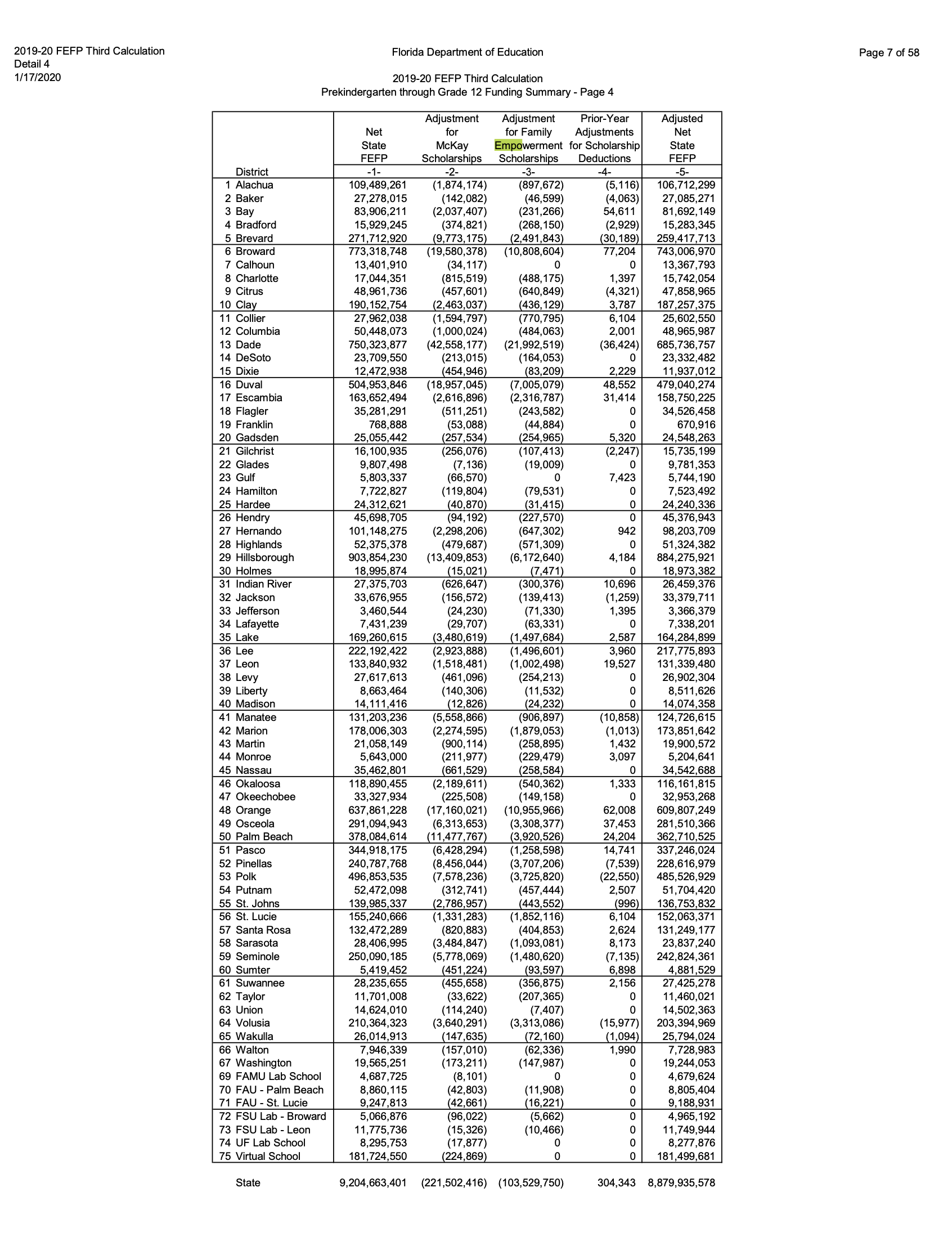SLOW DOWN: Stop the Never-Ending Voucher Expansion
Originally heralded as the “Year of the Teacher” by Governor DeSantis, in the final days of the Legislative Session, it appears 2020 may go down in history as the year the never-ending voucher expansion kicked into full gear.
HB7067 (and its companion SB1220), by quadrupling the current annual enrollment growth rate and placing income thresholds on an automatic escalator for the state’s new, directly funded Florida Empowerment Scholarship, could result in massive voucher expansion WITHOUT requiring a single new vote by future Legislatures. By 2025, the automatic expansion outlined in HB7067 could result in a 915% enrollment increase, at a cost of nearly $1 BILLION to local districts, serving qualifying families earning nearly twice Florida’s Median Household Income. Initially sold as a program for families with “limited financial resources,” it won’t take long before everyone qualifies.
Last session, school choice advocates celebrated as they passed a bill creating the Family Empowerment Scholarship, purportedly designed to eliminate a supposed “waitlist” for the Florida Tax Credit Scholarship (FTCS). The FTCS uses diverted corporate tax credits to fund vouchers to private (mostly religious) schools in a money laundering-like scheme created to get around restrictions to direct public funding of religious institutions.
The FTCS program claims to serve primarily low income students but, in the years since it was created, the qualifying family income caps have been repeatedly increased. The current cap for FTCS is 260% of the Federal Poverty Level (FPL) or $66,950 for a family of 4, though priority is given to students whose household income does not exceed 185% of FPL ($47,638) or are in foster care.
Last session’s new Family Empowerment Scholarship (FES) ignored all of those pesky religious institution restrictions, funding the FES vouchers directly from the Florida Education Finance Program (FEFP), the State’s funding formula for our public schools. The funds for FES vouchers are taken directly out of districts’ FEFP funding, after the third calculation of student population.
The current qualifying family income cap for FES is 300% of the Federal Poverty Level (FPL) or $77,250 for a family of 4, though priority is, also, given to students whose household income does not exceed 185% of FPL ($47,638) or are in foster care.
For the record, Florida’s Median Household income is 55,462, meaning families earning well above the median income currently qualify for these vouchers.
In its inaugural year, 17,724 (out of a maximum 18,000) FES vouchers were funded through the FEFP at a cost of $103.5 MILLION to the State’s public schools. Impact varied between individual districts: Miami-Dade $22 Million, Orange $11 Million, Duval $7 Million, etc., but few districts were left untouched:

HB7067/SB1220 seek to continually expand the available number of FES vouchers by 1% of the State student population, or 28,000 students per year. In Senate Appropriations, SB1220 sponsor Manny Diaz Jr claimed the expansion was needed to eliminate a “waitlist of 35,000 students.”
QUESTION: If there was a waitlist of students, why didn’t the FES give out ALL of its 18,000 available vouchers this year? Seems suspicious…
HB7067’s automatically expanding the FES enrollment caps could, by 2025, result in a 915% enrollment increase, at a cost of nearly $1 BILLION to local districts.

If, after continually expanding the number of available vouchers, more than 5 percent of the increased number of scholarships have not been awarded, HB7067 requires the maximum household income level be increased by 25% in the following fiscal year. This automatic escalator could rapidly increase the income “cap” until virtually all families became eligible. For example:

A billion dollar private school voucher program for families earning more than $100,000 a year, using funds originally intended for Florida’s public schools, is dramatically different from the program initially sold to us as a program for families, with “limited financial resources, supposedly “trapped in failing public schools.”
Should such expansion occur without further public debate and/or approval by future legislatures? Should FEFP funds flow to private religious schools in ever-increasing amounts without input from the lawmakers who have a paramount duty to adequately fund public schools?
We think not.
HB7067 will be debated on the House floor tomorrow (3/6/2020). SB1220 is expected to hit the Senate floor next week. NOW is the time to call your legislators and tell them to SLOW DOWN. Stop the never-ending expansion of publicly funded vouchers in HB7067 and SB1220.
You can find your legislators here: https://www.flsenate.gov/Senators/Find
You can follow this link to send a message regarding HB7067 to the entire Florida House: https://fundeducationnow.org/take-action-house-vote-on-anti-public-ed-hb-7067-tomorrow/?fbclid=IwAR1DfGSYAUarjffoZb4hYxGHxndnEFA_w7TFcjRBedM4YnOfy7ua2sNvJaE
Contact them NOW!

5 Comments